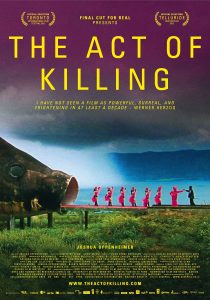
 The IFC Center: Friday, November 15 @ 1:45pm
The IFC Center: Friday, November 15 @ 1:45pmHistory is written by the winners, the victors, the conquerors. Perhaps this is why the Indonesian killings of 1965-1966 have gone largely unrecorded in history books. Unlike other genocidal leaders who were ultimately defeated (Hitler, Idi Amin, etc.), the party that murdered over 500,000 Indonesian citizens in one year is still in power, with its leaders hailed as cultural heroes. They were never brought to justice, but surely such widespread death must have an effect, even on the most hardened of souls. "The Act Of Killing" is a fascinating examination of the lingering effects of this mass slaughter on the perpetrators and of the power of art to motivate people in both terrible and beautiful ways.
Filmmaker Joshua Oppenheimer ventured to Indonesia to personally interview death squad leaders such as Anwar Congo (who becomes the film's central focus). Under the guise of helping these men glorify their killings, he tasked them with recreating their murders for the camera, in whatever way they wished. Obsessed with American films, Congo and his cohorts chose to reenact their crimes in a series of increasingly stylized vignettes in the genres of their favorite movies: westerns, musicals, and gangster noir. What follows is an emotionally-shattering descent into murder, madness, and, most surprisingly, contrition.
"The Act Of Killing" isn't fiction, and Anwar Congo isn't one of those archetypal antiheroes that modern audiences love to hate. Congo didn't strangle 1,000 people with a piece of wire for any forgivable purpose -- and there's no chance here for a redemptive eleventh-hour change of heart. Hannah Arendt's popularized concept of "the banality of evil" is on full display here, as these men fondly reminisce about the days of the "Crush The Chinese" campaign, chuckle at the memory of countless murders, and gleefully recreate horrific scenes from their past. This remains the status quo until Congo is asked to step into the shoes of a victim for one of the reenactments.
As Congo watches footage of himself in the role of victim, "The Act Of Killing" adds on layers of meaning. It has become not just a rumination on the mental state of mass murderers, but a testimony to the power of cinema to shape hearts and minds. We know it can inspire people to acts of violence -- movies served as both influence and justification in these killings. But, by the end of the documentary, film has also accomplished what reality, logic, memories, and history books could not: it has affected the thinking of one of the most hardened, disturbed minds in existence today.
"The Act Of Killing" is quite possibly the definition of "essential" viewing, and a film not to be missed at DOC NYC this year.
[youtube]https://www.youtube.com/watch?v=SD5oMxbMcHM[/youtube]